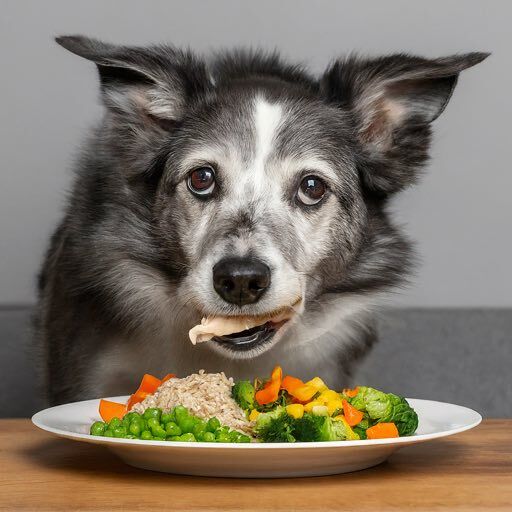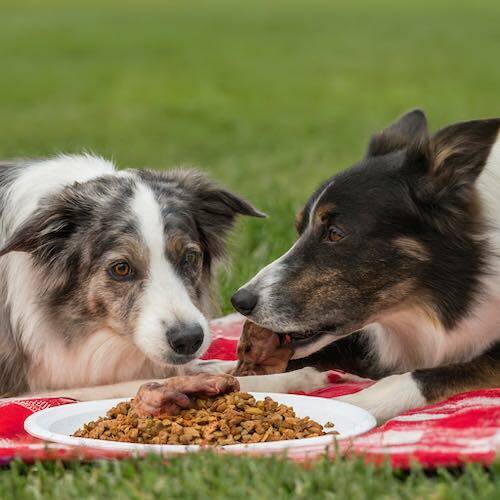The Best Diet for Senior Border Collies: Supporting Your Aging Companion Introduction
Aging Border Collies, renowned for their intelligence, agility, and loyalty, face a series of physiological changes that can influence their health, energy levels, and nutritional requirements. These highly active dogs start to show signs of aging around eight to nine years old, transitioning into a phase where their diet plays a crucial role in countering the effects of aging and supporting their decreasing energy levels, slower metabolism, and potential health issues like joint discomfort, digestive problems, or weight changes.
Adapting their diet to these changes is essential for maintaining their health and quality of life during their senior years. This involves understanding the specific changes occurring in their bodies and how these impact nutritional needs. For example, senior Border Collies may experience a reduction in muscle mass, necessitating a diet rich in high-quality protein to maintain muscle health.
Their digestive efficiency might decline, calling for easily digestible foods and an increase in certain types of dietary fiber. Additionally, with the increased risk of chronic conditions such as arthritis or heart disease, diets that bolster heart health, joint support, and immune function become paramount.
This article delves into the optimal dietary practices for aging Border Collies, providing insights into how to keep them active, happy, and healthy as they age. By selecting the appropriate foods and adjusting meal portions according to their evolving needs, owners can significantly influence their senior Border Collies’ overall health.
Search: Best Border Collie Products Online
Understanding Aging in Border Collies
The progression into seniority marks a critical period in a Border Collie’s life, demanding increased attention to their diet and nutritional intake. This stage introduces significant shifts in their physical health and metabolic processes, which can greatly affect their well-being.
Conditions such as arthritis may become more common, leading to discomfort and a decrease in physical activity. This, coupled with a natural decline in metabolic rate, underscores the importance of dietary adjustments to prevent obesity—a condition that could exacerbate joint issues and contribute to the development of other diseases.
Recognizing these health challenges is key for owners looking to proactively support their aging Border Collie’s health through nutrition. A diet tailored to lower caloric intake but enriched with vital nutrients can aid in weight management and support joint health.
The inclusion of omega-3 fatty acids is beneficial for reducing inflammation, while dietary adjustments to improve food texture and flavor can help maintain appetite and enjoyment of meals. By identifying the signs of aging and modifying the diet to address these concerns, owners can play a significant role in their pet’s health, ensuring comfort and happiness in their later years.
Nutritional Needs of Aging Border Collies
Reduced Calorie Intake
The slowing metabolism of aging Border Collies requires a careful consideration of calorie intake to avoid the risk of obesity, which can aggravate conditions like arthritis and lead to diabetes.
Increased Protein
To counter the loss of muscle mass, a diet with high-quality protein is essential for maintaining muscle health and supporting overall bodily functions without putting undue stress on the kidneys.
Essential Fatty Acids
The anti-inflammatory properties of omega-3 fatty acids, commonly found in fish oil, are particularly beneficial for aging Border Collies, aiding in joint health and reducing discomfort from conditions such as arthritis.
Fiber
An increased fiber content in the diet can help manage weight, improve digestive health, and is advantageous for Border Collies with diabetes by helping to regulate blood sugar levels.
Vitamins and Minerals
Vitamins E and C offer antioxidant benefits, supporting immune health, while adequate levels of calcium and phosphorus are crucial for maintaining bone health in senior Border Collies.
Recommended Foods for Aging Border Collies
High-quality commercial senior dog foods are available that cater specifically to the needs of aging canines, including Border Collies. These foods are formulated to provide a balanced diet with a reduced calorie count, enhanced fiber levels for digestive health, and adjusted protein content to support muscle mass without overburdening the kidneys. Selecting a reputable brand that prioritizes whole food ingredients and minimizes fillers is crucial for optimizing your dog’s health.
Incorporating fresh foods into your Border Collie’s diet can boost their intake of essential vitamins and minerals. Lean meats, fish rich in omega-3 fatty acids, and a variety of vegetables can provide a nutritional enhancement to their meals. Fresh foods can also make meals more appealing for senior dogs who may have become more selective in their tastes.
Supplements, including glucosamine and chondroitin for joint health and omega-3 fatty acids for cognitive function and inflammation reduction, can play a vital role in managing age-related health issues. However, always consult with a veterinarian to ensure that any supplements are appropriate for your dog’s specific health needs, offering a customized approach to support their well-being in their senior years.
Foods to Avoid
Ensuring the health and longevity of aging Border Collies involves careful consideration of their dietary needs and avoiding foods that pose significant risks. Owners must be particularly vigilant about excluding high-fat and high-sodium items from their senior dogs’ diets, as these can contribute to unhealthy weight gain and complicate existing heart conditions.
Furthermore, awareness and avoidance of universally toxic foods for dogs, such as chocolate, grapes, onions, and any products containing xylitol, are critical. These substances can be deadly to dogs, causing severe health issues ranging from acute kidney failure to hypoglycemia.
In addition to these well-known dangers, avocados, macadamia nuts, alcohol, and caffeinated beverages must also be avoided. Each of these can lead to various adverse health effects, from digestive disturbances to severe nervous system damage, posing unnecessary risks to your aging Border Collie’s health. Maintaining a diet that steers clear of these harmful foods is essential for preventing a wide array of potential health complications in senior dogs.
Consulting with a veterinarian regularly is the best way to ensure that your senior Border Collie’s diet is safe, balanced, and tailored to their specific health needs. Professional guidance can help you navigate the complexities of canine nutrition, especially as your dog ages, and provide the peace of mind that comes from knowing you’re supporting your pet’s wellbeing to the fullest.
By prioritizing a diet that avoids these dangerous foods, owners can play a pivotal role in safeguarding the health and enhancing the quality of life of their aging Border Collies, ensuring they remain happy, active, and by their side for as long as possible.
Feeding Schedule and Portion Control
Maintaining a consistent feeding schedule and practicing portion control are essential strategies for managing the health of senior Border Collies. Adapting to smaller, more frequent meals can accommodate their older digestive systems and help regulate energy levels throughout the day. Portion control is vital to align with their decreased caloric needs, preventing obesity and its associated health risks. This approach not only helps maintain weight but supports joint health and promotes an overall sense of well-being in your aging companion.
Special Considerations
Addressing the unique health issues that aging Border Collies face is a critical aspect of their care, necessitating a customized approach to their diet. For dogs dealing with specific conditions such as kidney disease or heart problems, tailoring their nutrition under the guidance of a veterinarian can have a profound impact on managing these issues and enhancing their overall quality of life.
A diet formulated to support kidney function, for example, may include lower levels of protein and phosphorus, while a heart-healthy diet might focus on reduced sodium levels and the inclusion of omega-3 fatty acids to support cardiovascular health.
In addition to addressing health conditions through diet, enhancing the palatability of meals is essential for senior Border Collies, who may experience a decrease in their sense of smell and taste. This decrease can lead to reduced appetite and interest in food, making mealtime challenging. Warming food to release aromas or adding flavorful enhancements such as chicken broth, pumpkin, or a sprinkle of cheese can make meals more appealing. These simple modifications can stimulate their appetite and encourage adequate nutrient intake, ensuring they receive the essential nutrition needed to maintain health and vitality.
Conclusion
The dietary needs of Border Collies evolve as they age, necessitating adjustments by their owners to support their health and happiness. As they move into their senior years, providing a balanced diet specific to their changing requirements is crucial. Nutritional shifts can help manage age-related conditions, support joint health, promote optimal energy levels, and ultimately maintain their quality of life. Regular consultations with a veterinarian are invaluable for obtaining personalized nutritional advice. Your vet can recommend age-appropriate foods, address specific health concerns, and help you monitor your senior Border Collie’s weight – all critical elements for ensuring your loyal companion continues to thrive.
Consultation with a Veterinarian
Before implementing any significant dietary changes for your senior Border Collie, consulting with a veterinarian is absolutely crucial. Your vet can assess your companion’s overall health, identify any specific needs, and take into account any existing medical conditions. This allows them to personalize a nutrition plan that will optimally support your Border Collie’s health and well-being in their golden years. Remember, your veterinarian is an invaluable partner in ensuring your furry friend lives a long, healthy, and happy life.




